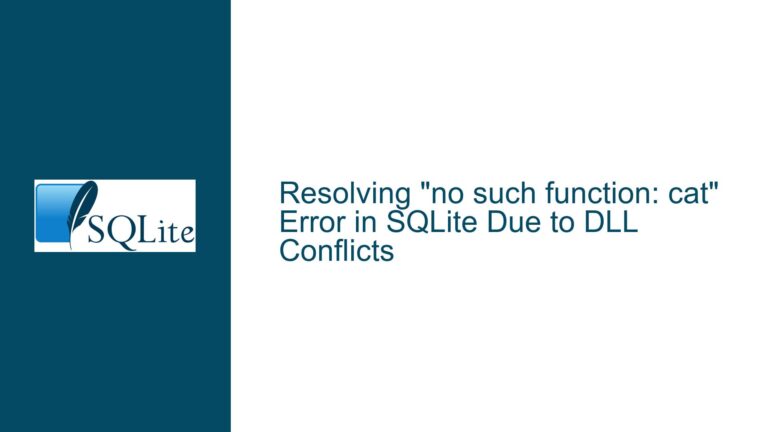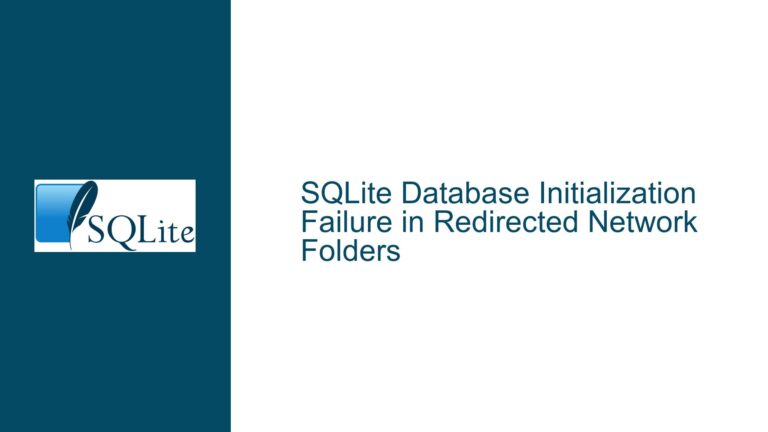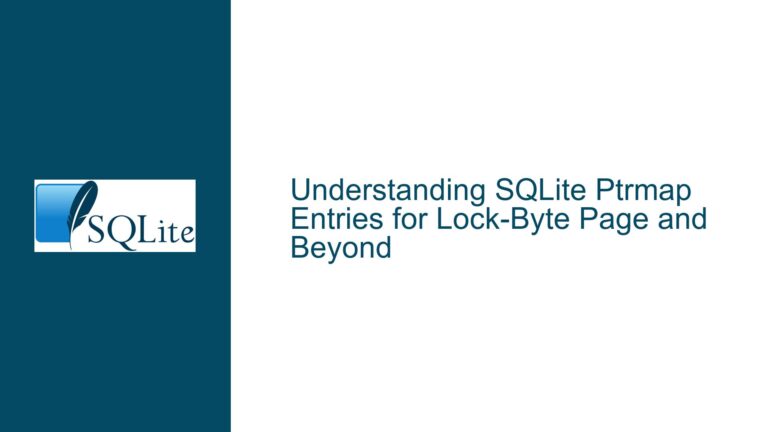Handling Const Correctness in SQLite3 carray Bindings and Pointer Safety
Const-Correctness Challenges in SQLite3 carray Virtual Table Bindings
Issue Overview: Const Pointer Safety in SQLite3 carray Extension and Bindings
The core issue revolves around the interaction between SQLite’s carray virtual table extension and its pointer binding API, specifically the sqlite3_bind_pointer function and the sqlite3_carray_bind utility. Developers working with read-only data (declared as const in C/C++) encounter a conflict when passing pointers to this data through SQLite’s carray extension. The problem arises because the carray API expects a non-const pointer (void*), forcing developers to cast away the const qualifier. This casting introduces risks of undefined behavior (UB) if the underlying data is modified inadvertently, even though the carray virtual table is designed as read-only.
The carray extension allows SQL queries to treat in-memory arrays as virtual tables, enabling efficient joins or filters against application data. For example, a developer might bind a const int[] array to a virtual table for querying. However, the sqlite3_carray_bind function’s parameter signature accepts a void** (non-const), requiring a cast from const void* to void*. While SQLite’s virtual table API does not modify the data (lacking an xUpdate method), the C/C++ standards strictly prohibit casting away const unless the original object is non-const. This creates a contractual mismatch: the developer’s data is semantically read-only, but the API’s type system does not enforce this.
Further complications arise from SQLite’s Pointer Passing Interface, which treats pointers as opaque values. The library does not dereference these pointers, but the type system’s lack of const propagation means that static analysis tools or strict compilers may flag these casts as potential UB. For example, in C++, using const_cast to bind a const array to sqlite3_carray_bind is legal only if the original array is non-const. If the array is genuinely read-only (e.g., located in ROM or a write-protected memory segment), casting away const violates the language standard, even if no actual modification occurs.
The discussion also touches on broader concerns about pointer representation across architectures. While the C standard mandates that const and non-const pointers to the same type have identical representation (C11 §6.2.5/28), this does not absolve the developer from type-system violations. Even if the physical pointer bits are unchanged, the logical contract of const is broken, risking optimizer-induced bugs or platform-specific edge cases.
Root Causes: API Design, Const Semantics, and Undefined Behavior
1. SQLite’s C API Design and Const Omission
SQLite’s APIs are designed for C compatibility, prioritizing simplicity and broad interoperability over type-system rigor. Functions like sqlite3_bind_pointer use void* for generality, avoiding const qualifiers to accommodate diverse use cases. However, this design clashes with modern best practices for const correctness, where interfaces should reflect whether they intend to modify data. The carray extension’s sqlite3_carray_bind inherits this limitation, as it builds atop the lower-level sqlite3_bind_pointer.
In C, const correctness is advisory rather than enforceable. A function parameter declared as void* can accept both const and non-const pointers, but the callee’s intent (read vs. write) is not encoded in the type. The carray extension’s documentation clarifies that it does not modify the data, but the API’s signature does not reinforce this, leaving developers to rely on external assurances.
2. C vs. C++ Const Semantics and Undefined Behavior
In C++, casting away const from a genuinely read-only object is undefined behavior (UB), even if no modification occurs. For example:
const int data[] = {1, 2, 3};
// Undefined behavior:
sqlite3_carray_bind(stmt, 1, const_cast<int*>(data), ...);
In C, the situation is less clear-cut. The C standard permits casting const away if the original object is modifiable (C11 §6.3.2.3/2), but UB occurs if the object is actually read-only. This creates a fragile situation: developers must know the provenance of their pointers to avoid UB, which is impractical in large codebases or libraries.
3. Pointer Representation Myths and Harvard Architectures
A tangential concern involves platforms where const and non-const pointers might have different representations. The C standard explicitly forbids this for pointers to compatible types (§6.2.5/28), but exceptions exist for function vs. data pointers (e.g., Harvard architectures). While SQLite targets systems with unified code/data address spaces, embedded developers using carray on microcontrollers might face issues. However, such platforms are rare, and the primary issue remains logical (type-system) rather than physical (pointer bits).
Solutions: Enforcing Const Correctness in carray and Safe Pointer Practices
1. Modify the carray Extension for Const Correctness
The most robust solution is to adjust the carray extension’s API to accept const void* pointers. This involves:
Updating Function Signatures:
// Original: int sqlite3_carray_bind(sqlite3_stmt*, int, void**, int, int); // Const-correct: int sqlite3_carray_bind_const(sqlite3_stmt*, int, const void**, int, int);A new function
sqlite3_carray_bind_constwould propagate theconstqualifier, aligning the API with the virtual table’s read-only nature.Internal Casting Within carray:
Inside the carray implementation, safely castconst void**tovoid**only if the data is guaranteed read-only. Since the virtual table lacks anxUpdatemethod, this is inherently safe. For example:static int carrayFilter(...) { const CarrayArray *pArray = (const CarrayArray*)pVtab; // Use pArray->aData as read-only }
2. Wrapper Functions for Const Safety
Developers can create wrapper functions to encapsulate unsafe casts, localizing UB risk:
int safe_carray_bind(sqlite3_stmt* stmt, int idx, const void* data, int count) {
return sqlite3_carray_bind(stmt, idx, (void**)&data, count, CARRAY_INT32);
}
This wrapper accepts a const void*, performs the cast internally, and documents the assumption that SQLite will not modify the data. Combined with assertions or runtime checks (e.g., memory protection queries), this reduces UB exposure.
3. Leveraging SQLite’s Pointer Passing Semantics
SQLite’s Pointer Passing Interface treats bound pointers as opaque values, never dereferencing them. Thus, the const qualifier is irrelevant to the library itself—it merely stores and retrieves the pointer value. Developers can use this to their advantage:
- Type Erasure with Struct Wrapping:
typedef struct { const int* data; size_t size; } ConstIntArray; ConstIntArray arr = { .data = my_const_data, .size = 100 }; sqlite3_bind_pointer(stmt, 1, &arr, "ConstIntArray", NULL);The virtual table’s
xBestIndexorxFiltermethod can then safely cast the pointer back toConstIntArray*and accessdataas read-only.
4. Static Analysis and Compiler Directives
Modern compilers and static analyzers can be configured to tolerate deliberate const casts when accompanied by assurances:
- Compiler-Specific Suppression:
#pragma GCC diagnostic push #pragma GCC diagnostic ignored "-Wcast-qual" sqlite3_carray_bind(stmt, 1, (void**)&data, ...); #pragma GCC diagnostic pop - Static Assertions for Pointer Compatibility:
static_assert(sizeof(const void*) == sizeof(void*), "const and non-const pointers must be compatible");
5. Advocating for SQLite API Enhancements
For long-term resolution, propose extending SQLite’s API to include const-aware variants:
int sqlite3_bind_const_pointer(
sqlite3_stmt*, int, const void*, const char*, void(*)(const void*)
);
This would require modifications to SQLite’s internals but would align the library with modern const correctness practices.
Conclusion: Balancing Pragmatism and Correctness
The tension between SQLite’s C-oriented API design and strict const correctness highlights a common dilemma in systems programming: balancing practicality with formal correctness. While immediate fixes involve localized workarounds (wrapper functions, carray modifications), the broader solution lies in enhancing SQLite’s APIs to reflect modern type safety expectations. Developers must assess their risk tolerance: if the data’s immutability is certain (e.g., static arrays), cautious casting is acceptable. For critical systems, deeper integration of const correctness into SQLite’s extensions is warranted.






